Songkran Festival: Cultural Event Analysis, Impacts and Sustainability
VerifiedAdded on 2023/06/11
|12
|3075
|108
Essay
AI Summary
This essay provides a comprehensive analysis of the Songkran festival in Thailand, also known as the Thai New Year and water festival. It delves into the festival's history, tracing its origins to Sanskrit and Hindu traditions, and its evolution into a modern celebration involving water splashing and cultural performances. The literature review highlights scholarly perspectives on Songkran's cultural importance and its role in Thailand's tourism. The essay further examines the festival through the lens of sustainability principles, considering its social-cultural, economic, and environmental impacts, both positive and negative. It identifies key stakeholders, including sponsors, attendees, participants, suppliers, and spectators, and assesses their experiences. The essay also explores decision-making strategies to mitigate the negative effects of the festival, such as water wastage, and concludes by emphasizing the significance of cultural events like Songkran in Thailand's overall development. Desklib provides access to this and many other solved assignments for students.
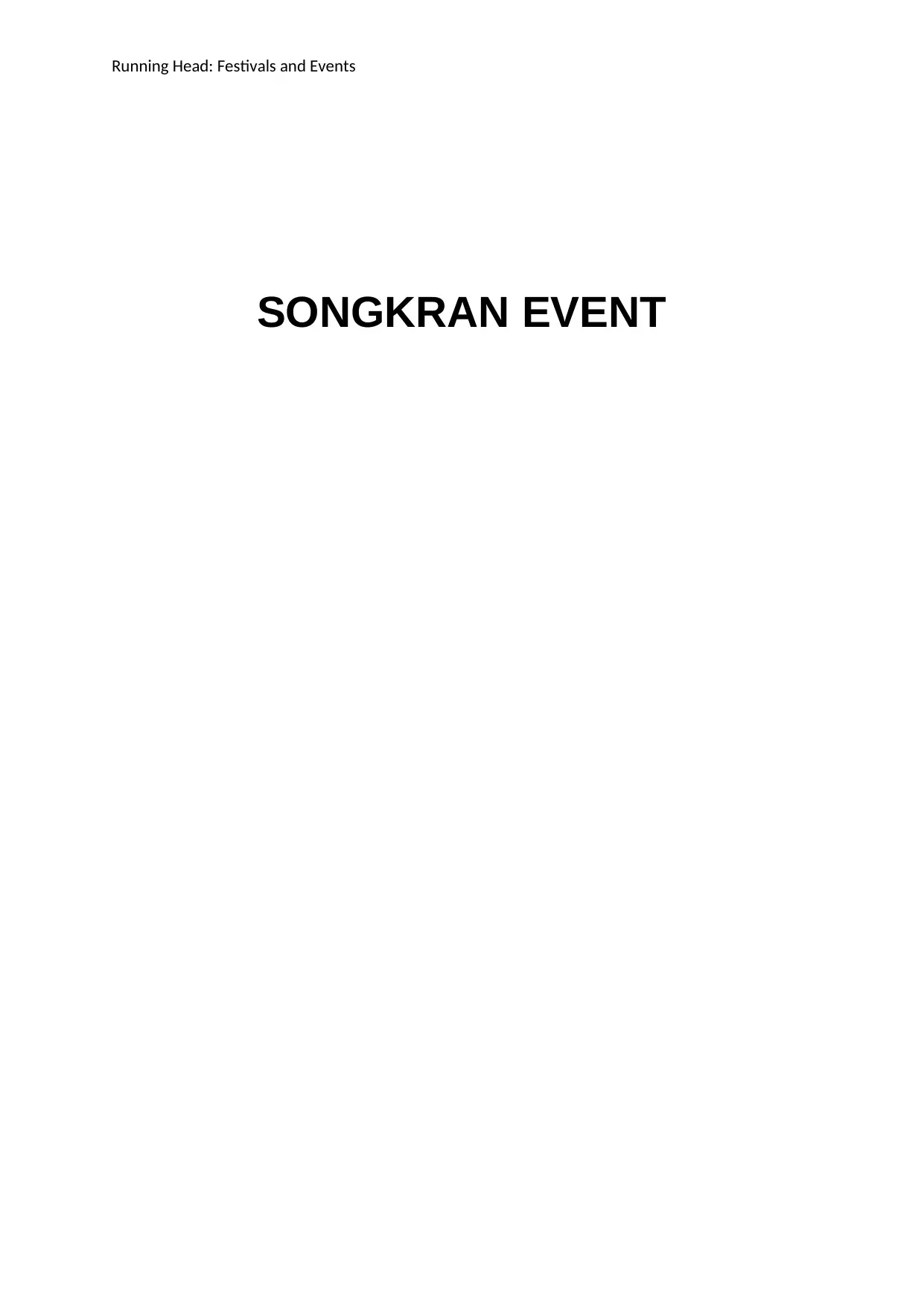
Running Head: Festivals and Events
SONGKRAN EVENT
SONGKRAN EVENT
Paraphrase This Document
Need a fresh take? Get an instant paraphrase of this document with our AI Paraphraser
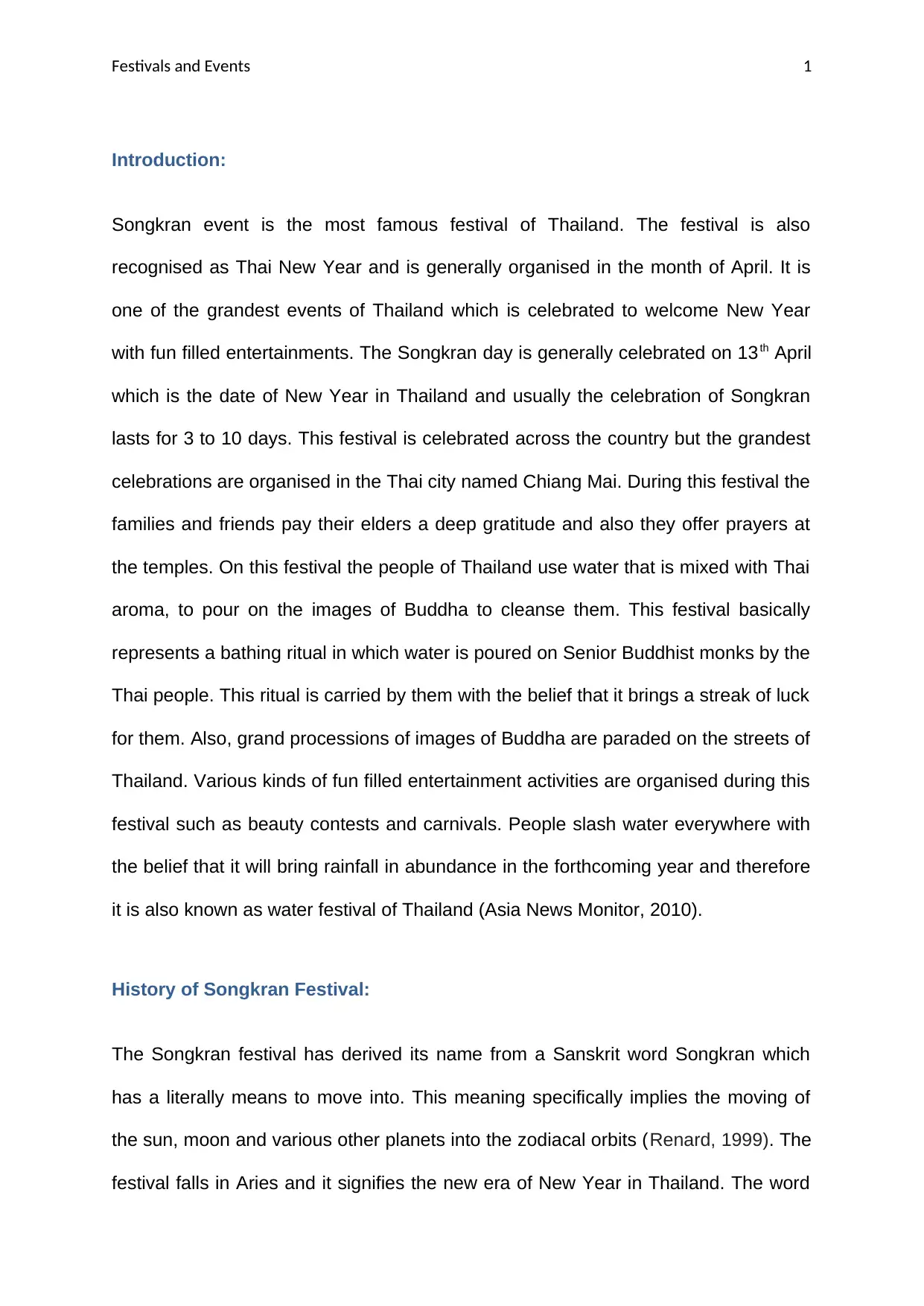
Festivals and Events 1
Introduction:
Songkran event is the most famous festival of Thailand. The festival is also
recognised as Thai New Year and is generally organised in the month of April. It is
one of the grandest events of Thailand which is celebrated to welcome New Year
with fun filled entertainments. The Songkran day is generally celebrated on 13th April
which is the date of New Year in Thailand and usually the celebration of Songkran
lasts for 3 to 10 days. This festival is celebrated across the country but the grandest
celebrations are organised in the Thai city named Chiang Mai. During this festival the
families and friends pay their elders a deep gratitude and also they offer prayers at
the temples. On this festival the people of Thailand use water that is mixed with Thai
aroma, to pour on the images of Buddha to cleanse them. This festival basically
represents a bathing ritual in which water is poured on Senior Buddhist monks by the
Thai people. This ritual is carried by them with the belief that it brings a streak of luck
for them. Also, grand processions of images of Buddha are paraded on the streets of
Thailand. Various kinds of fun filled entertainment activities are organised during this
festival such as beauty contests and carnivals. People slash water everywhere with
the belief that it will bring rainfall in abundance in the forthcoming year and therefore
it is also known as water festival of Thailand (Asia News Monitor, 2010).
History of Songkran Festival:
The Songkran festival has derived its name from a Sanskrit word Songkran which
has a literally means to move into. This meaning specifically implies the moving of
the sun, moon and various other planets into the zodiacal orbits (Renard, 1999). The
festival falls in Aries and it signifies the new era of New Year in Thailand. The word
Introduction:
Songkran event is the most famous festival of Thailand. The festival is also
recognised as Thai New Year and is generally organised in the month of April. It is
one of the grandest events of Thailand which is celebrated to welcome New Year
with fun filled entertainments. The Songkran day is generally celebrated on 13th April
which is the date of New Year in Thailand and usually the celebration of Songkran
lasts for 3 to 10 days. This festival is celebrated across the country but the grandest
celebrations are organised in the Thai city named Chiang Mai. During this festival the
families and friends pay their elders a deep gratitude and also they offer prayers at
the temples. On this festival the people of Thailand use water that is mixed with Thai
aroma, to pour on the images of Buddha to cleanse them. This festival basically
represents a bathing ritual in which water is poured on Senior Buddhist monks by the
Thai people. This ritual is carried by them with the belief that it brings a streak of luck
for them. Also, grand processions of images of Buddha are paraded on the streets of
Thailand. Various kinds of fun filled entertainment activities are organised during this
festival such as beauty contests and carnivals. People slash water everywhere with
the belief that it will bring rainfall in abundance in the forthcoming year and therefore
it is also known as water festival of Thailand (Asia News Monitor, 2010).
History of Songkran Festival:
The Songkran festival has derived its name from a Sanskrit word Songkran which
has a literally means to move into. This meaning specifically implies the moving of
the sun, moon and various other planets into the zodiacal orbits (Renard, 1999). The
festival falls in Aries and it signifies the new era of New Year in Thailand. The word
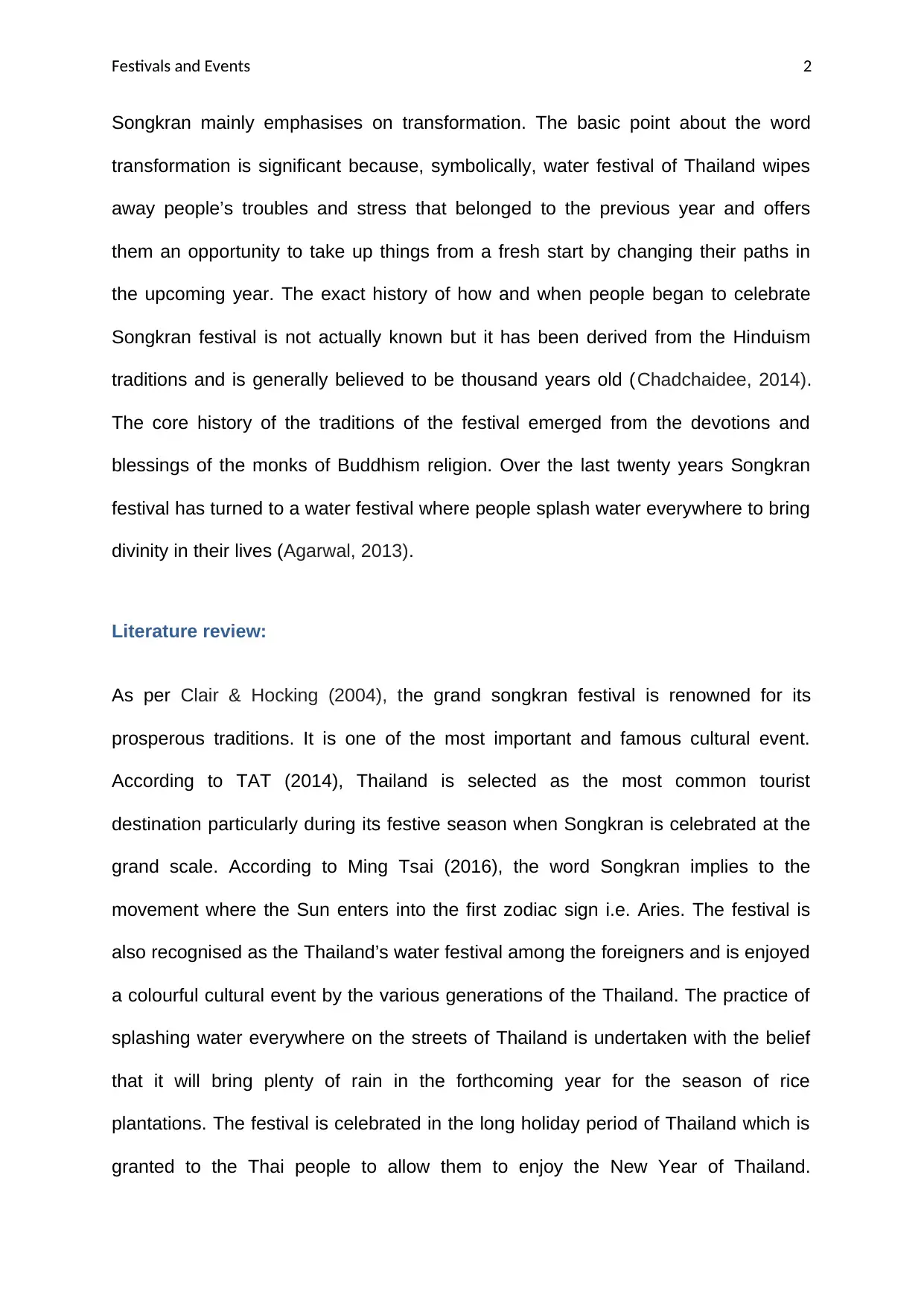
Festivals and Events 2
Songkran mainly emphasises on transformation. The basic point about the word
transformation is significant because, symbolically, water festival of Thailand wipes
away people’s troubles and stress that belonged to the previous year and offers
them an opportunity to take up things from a fresh start by changing their paths in
the upcoming year. The exact history of how and when people began to celebrate
Songkran festival is not actually known but it has been derived from the Hinduism
traditions and is generally believed to be thousand years old (Chadchaidee, 2014).
The core history of the traditions of the festival emerged from the devotions and
blessings of the monks of Buddhism religion. Over the last twenty years Songkran
festival has turned to a water festival where people splash water everywhere to bring
divinity in their lives (Agarwal, 2013).
Literature review:
As per Clair & Hocking (2004), the grand songkran festival is renowned for its
prosperous traditions. It is one of the most important and famous cultural event.
According to TAT (2014), Thailand is selected as the most common tourist
destination particularly during its festive season when Songkran is celebrated at the
grand scale. According to Ming Tsai (2016), the word Songkran implies to the
movement where the Sun enters into the first zodiac sign i.e. Aries. The festival is
also recognised as the Thailand’s water festival among the foreigners and is enjoyed
a colourful cultural event by the various generations of the Thailand. The practice of
splashing water everywhere on the streets of Thailand is undertaken with the belief
that it will bring plenty of rain in the forthcoming year for the season of rice
plantations. The festival is celebrated in the long holiday period of Thailand which is
granted to the Thai people to allow them to enjoy the New Year of Thailand.
Songkran mainly emphasises on transformation. The basic point about the word
transformation is significant because, symbolically, water festival of Thailand wipes
away people’s troubles and stress that belonged to the previous year and offers
them an opportunity to take up things from a fresh start by changing their paths in
the upcoming year. The exact history of how and when people began to celebrate
Songkran festival is not actually known but it has been derived from the Hinduism
traditions and is generally believed to be thousand years old (Chadchaidee, 2014).
The core history of the traditions of the festival emerged from the devotions and
blessings of the monks of Buddhism religion. Over the last twenty years Songkran
festival has turned to a water festival where people splash water everywhere to bring
divinity in their lives (Agarwal, 2013).
Literature review:
As per Clair & Hocking (2004), the grand songkran festival is renowned for its
prosperous traditions. It is one of the most important and famous cultural event.
According to TAT (2014), Thailand is selected as the most common tourist
destination particularly during its festive season when Songkran is celebrated at the
grand scale. According to Ming Tsai (2016), the word Songkran implies to the
movement where the Sun enters into the first zodiac sign i.e. Aries. The festival is
also recognised as the Thailand’s water festival among the foreigners and is enjoyed
a colourful cultural event by the various generations of the Thailand. The practice of
splashing water everywhere on the streets of Thailand is undertaken with the belief
that it will bring plenty of rain in the forthcoming year for the season of rice
plantations. The festival is celebrated in the long holiday period of Thailand which is
granted to the Thai people to allow them to enjoy the New Year of Thailand.
⊘ This is a preview!⊘
Do you want full access?
Subscribe today to unlock all pages.

Trusted by 1+ million students worldwide
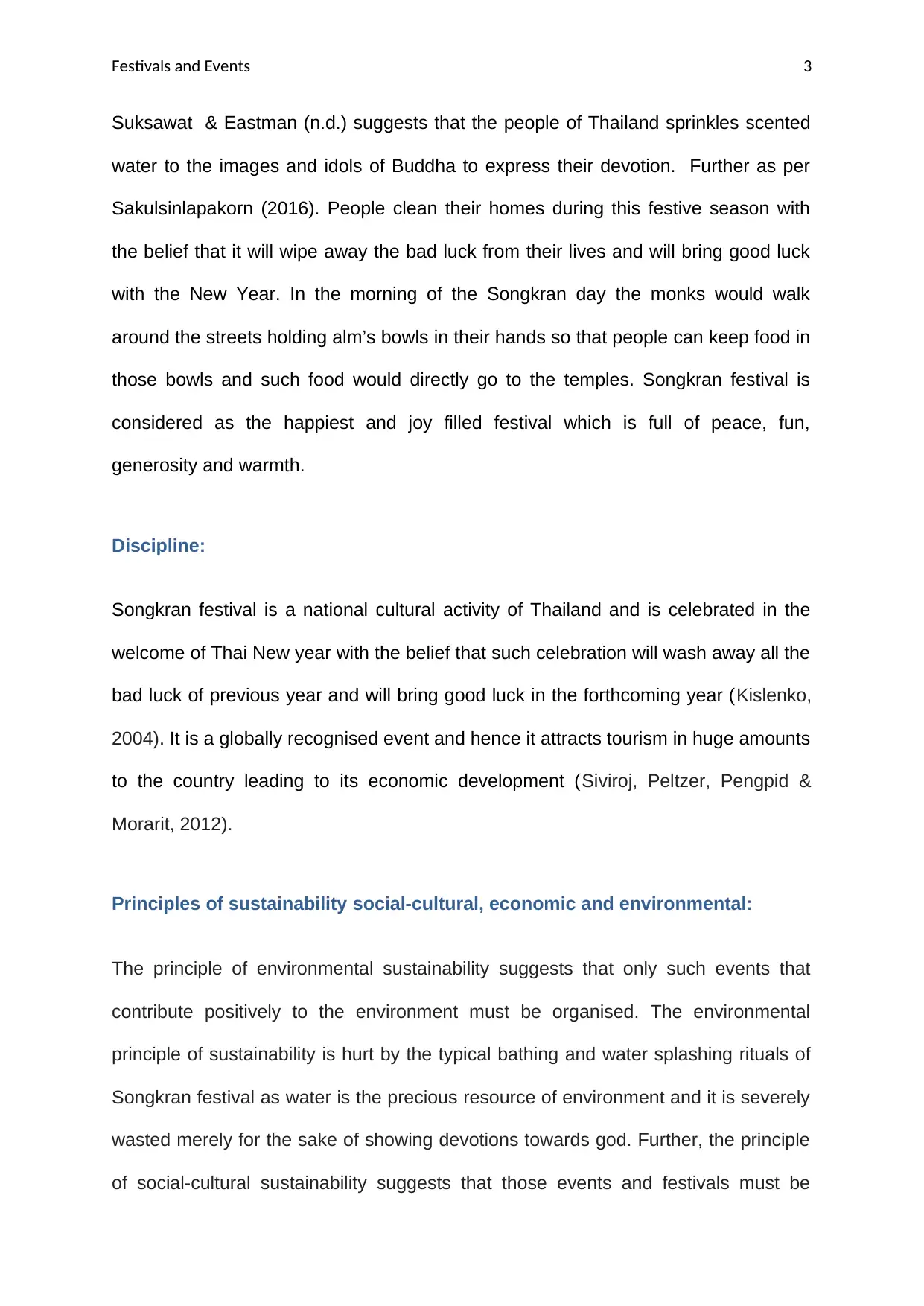
Festivals and Events 3
Suksawat & Eastman (n.d.) suggests that the people of Thailand sprinkles scented
water to the images and idols of Buddha to express their devotion. Further as per
Sakulsinlapakorn (2016). People clean their homes during this festive season with
the belief that it will wipe away the bad luck from their lives and will bring good luck
with the New Year. In the morning of the Songkran day the monks would walk
around the streets holding alm’s bowls in their hands so that people can keep food in
those bowls and such food would directly go to the temples. Songkran festival is
considered as the happiest and joy filled festival which is full of peace, fun,
generosity and warmth.
Discipline:
Songkran festival is a national cultural activity of Thailand and is celebrated in the
welcome of Thai New year with the belief that such celebration will wash away all the
bad luck of previous year and will bring good luck in the forthcoming year (Kislenko,
2004). It is a globally recognised event and hence it attracts tourism in huge amounts
to the country leading to its economic development (Siviroj, Peltzer, Pengpid &
Morarit, 2012).
Principles of sustainability social-cultural, economic and environmental:
The principle of environmental sustainability suggests that only such events that
contribute positively to the environment must be organised. The environmental
principle of sustainability is hurt by the typical bathing and water splashing rituals of
Songkran festival as water is the precious resource of environment and it is severely
wasted merely for the sake of showing devotions towards god. Further, the principle
of social-cultural sustainability suggests that those events and festivals must be
Suksawat & Eastman (n.d.) suggests that the people of Thailand sprinkles scented
water to the images and idols of Buddha to express their devotion. Further as per
Sakulsinlapakorn (2016). People clean their homes during this festive season with
the belief that it will wipe away the bad luck from their lives and will bring good luck
with the New Year. In the morning of the Songkran day the monks would walk
around the streets holding alm’s bowls in their hands so that people can keep food in
those bowls and such food would directly go to the temples. Songkran festival is
considered as the happiest and joy filled festival which is full of peace, fun,
generosity and warmth.
Discipline:
Songkran festival is a national cultural activity of Thailand and is celebrated in the
welcome of Thai New year with the belief that such celebration will wash away all the
bad luck of previous year and will bring good luck in the forthcoming year (Kislenko,
2004). It is a globally recognised event and hence it attracts tourism in huge amounts
to the country leading to its economic development (Siviroj, Peltzer, Pengpid &
Morarit, 2012).
Principles of sustainability social-cultural, economic and environmental:
The principle of environmental sustainability suggests that only such events that
contribute positively to the environment must be organised. The environmental
principle of sustainability is hurt by the typical bathing and water splashing rituals of
Songkran festival as water is the precious resource of environment and it is severely
wasted merely for the sake of showing devotions towards god. Further, the principle
of social-cultural sustainability suggests that those events and festivals must be
Paraphrase This Document
Need a fresh take? Get an instant paraphrase of this document with our AI Paraphraser
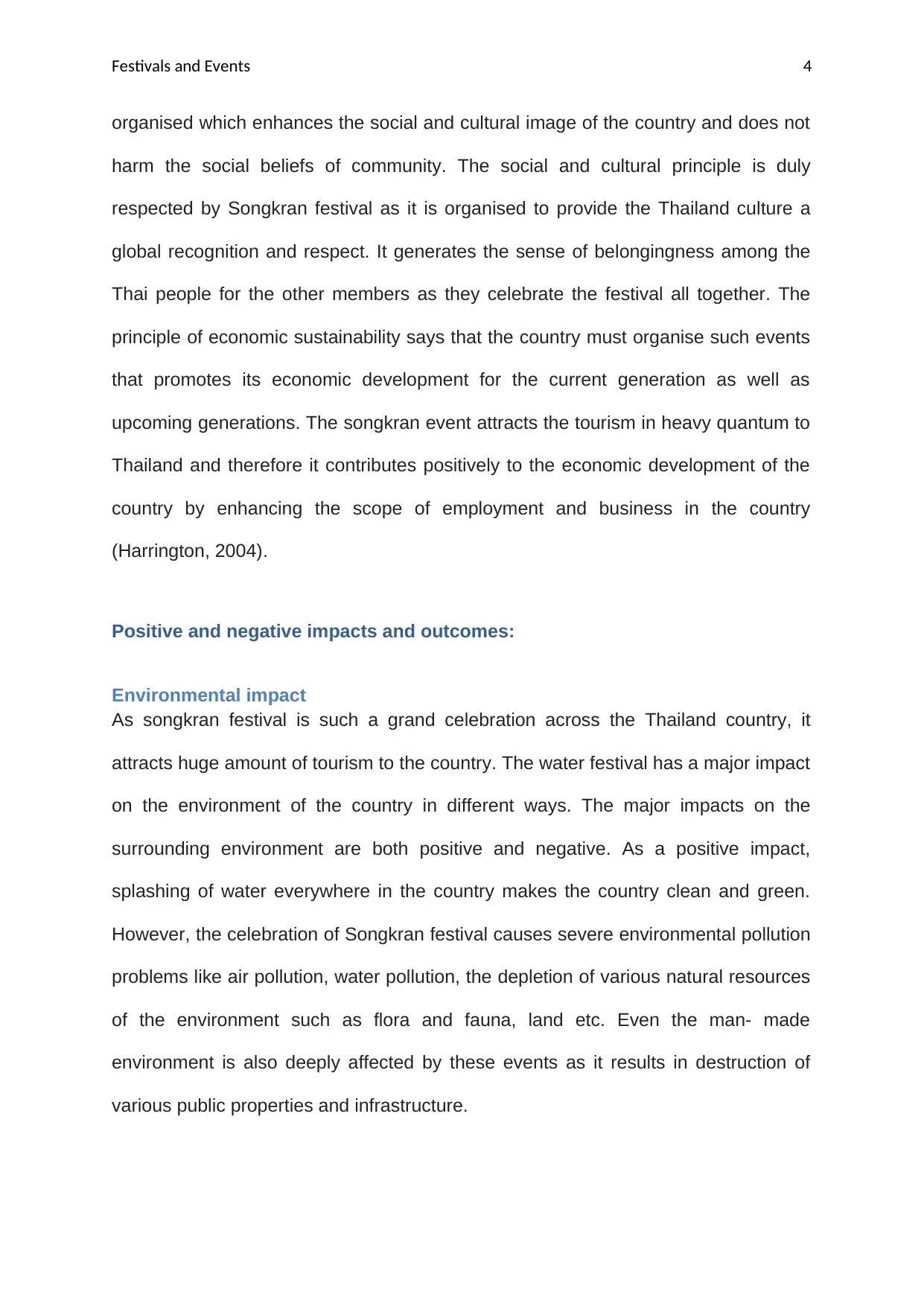
Festivals and Events 4
organised which enhances the social and cultural image of the country and does not
harm the social beliefs of community. The social and cultural principle is duly
respected by Songkran festival as it is organised to provide the Thailand culture a
global recognition and respect. It generates the sense of belongingness among the
Thai people for the other members as they celebrate the festival all together. The
principle of economic sustainability says that the country must organise such events
that promotes its economic development for the current generation as well as
upcoming generations. The songkran event attracts the tourism in heavy quantum to
Thailand and therefore it contributes positively to the economic development of the
country by enhancing the scope of employment and business in the country
(Harrington, 2004).
Positive and negative impacts and outcomes:
Environmental impact
As songkran festival is such a grand celebration across the Thailand country, it
attracts huge amount of tourism to the country. The water festival has a major impact
on the environment of the country in different ways. The major impacts on the
surrounding environment are both positive and negative. As a positive impact,
splashing of water everywhere in the country makes the country clean and green.
However, the celebration of Songkran festival causes severe environmental pollution
problems like air pollution, water pollution, the depletion of various natural resources
of the environment such as flora and fauna, land etc. Even the man- made
environment is also deeply affected by these events as it results in destruction of
various public properties and infrastructure.
organised which enhances the social and cultural image of the country and does not
harm the social beliefs of community. The social and cultural principle is duly
respected by Songkran festival as it is organised to provide the Thailand culture a
global recognition and respect. It generates the sense of belongingness among the
Thai people for the other members as they celebrate the festival all together. The
principle of economic sustainability says that the country must organise such events
that promotes its economic development for the current generation as well as
upcoming generations. The songkran event attracts the tourism in heavy quantum to
Thailand and therefore it contributes positively to the economic development of the
country by enhancing the scope of employment and business in the country
(Harrington, 2004).
Positive and negative impacts and outcomes:
Environmental impact
As songkran festival is such a grand celebration across the Thailand country, it
attracts huge amount of tourism to the country. The water festival has a major impact
on the environment of the country in different ways. The major impacts on the
surrounding environment are both positive and negative. As a positive impact,
splashing of water everywhere in the country makes the country clean and green.
However, the celebration of Songkran festival causes severe environmental pollution
problems like air pollution, water pollution, the depletion of various natural resources
of the environment such as flora and fauna, land etc. Even the man- made
environment is also deeply affected by these events as it results in destruction of
various public properties and infrastructure.
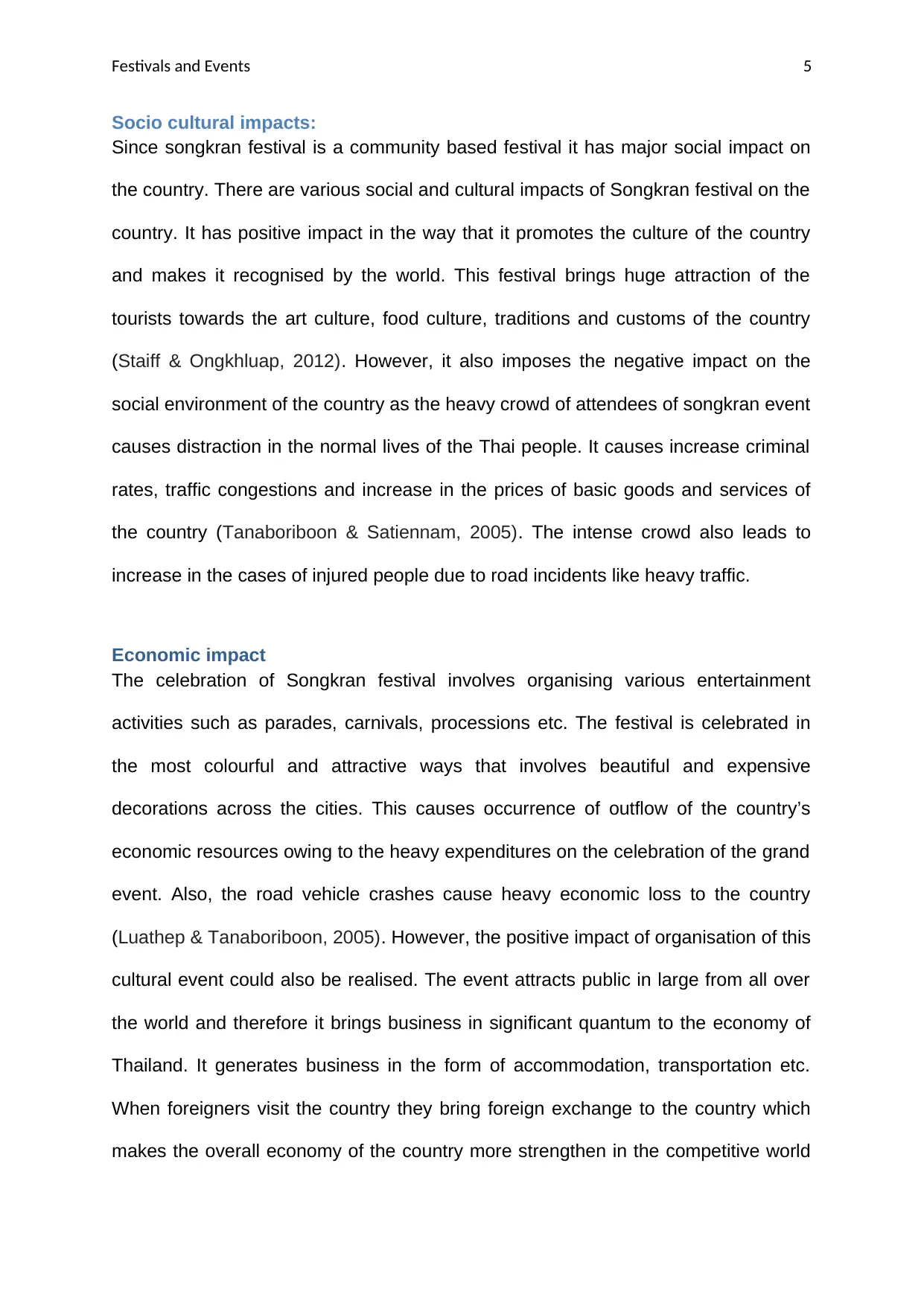
Festivals and Events 5
Socio cultural impacts:
Since songkran festival is a community based festival it has major social impact on
the country. There are various social and cultural impacts of Songkran festival on the
country. It has positive impact in the way that it promotes the culture of the country
and makes it recognised by the world. This festival brings huge attraction of the
tourists towards the art culture, food culture, traditions and customs of the country
(Staiff & Ongkhluap, 2012). However, it also imposes the negative impact on the
social environment of the country as the heavy crowd of attendees of songkran event
causes distraction in the normal lives of the Thai people. It causes increase criminal
rates, traffic congestions and increase in the prices of basic goods and services of
the country (Tanaboriboon & Satiennam, 2005). The intense crowd also leads to
increase in the cases of injured people due to road incidents like heavy traffic.
Economic impact
The celebration of Songkran festival involves organising various entertainment
activities such as parades, carnivals, processions etc. The festival is celebrated in
the most colourful and attractive ways that involves beautiful and expensive
decorations across the cities. This causes occurrence of outflow of the country’s
economic resources owing to the heavy expenditures on the celebration of the grand
event. Also, the road vehicle crashes cause heavy economic loss to the country
(Luathep & Tanaboriboon, 2005). However, the positive impact of organisation of this
cultural event could also be realised. The event attracts public in large from all over
the world and therefore it brings business in significant quantum to the economy of
Thailand. It generates business in the form of accommodation, transportation etc.
When foreigners visit the country they bring foreign exchange to the country which
makes the overall economy of the country more strengthen in the competitive world
Socio cultural impacts:
Since songkran festival is a community based festival it has major social impact on
the country. There are various social and cultural impacts of Songkran festival on the
country. It has positive impact in the way that it promotes the culture of the country
and makes it recognised by the world. This festival brings huge attraction of the
tourists towards the art culture, food culture, traditions and customs of the country
(Staiff & Ongkhluap, 2012). However, it also imposes the negative impact on the
social environment of the country as the heavy crowd of attendees of songkran event
causes distraction in the normal lives of the Thai people. It causes increase criminal
rates, traffic congestions and increase in the prices of basic goods and services of
the country (Tanaboriboon & Satiennam, 2005). The intense crowd also leads to
increase in the cases of injured people due to road incidents like heavy traffic.
Economic impact
The celebration of Songkran festival involves organising various entertainment
activities such as parades, carnivals, processions etc. The festival is celebrated in
the most colourful and attractive ways that involves beautiful and expensive
decorations across the cities. This causes occurrence of outflow of the country’s
economic resources owing to the heavy expenditures on the celebration of the grand
event. Also, the road vehicle crashes cause heavy economic loss to the country
(Luathep & Tanaboriboon, 2005). However, the positive impact of organisation of this
cultural event could also be realised. The event attracts public in large from all over
the world and therefore it brings business in significant quantum to the economy of
Thailand. It generates business in the form of accommodation, transportation etc.
When foreigners visit the country they bring foreign exchange to the country which
makes the overall economy of the country more strengthen in the competitive world
⊘ This is a preview!⊘
Do you want full access?
Subscribe today to unlock all pages.

Trusted by 1+ million students worldwide
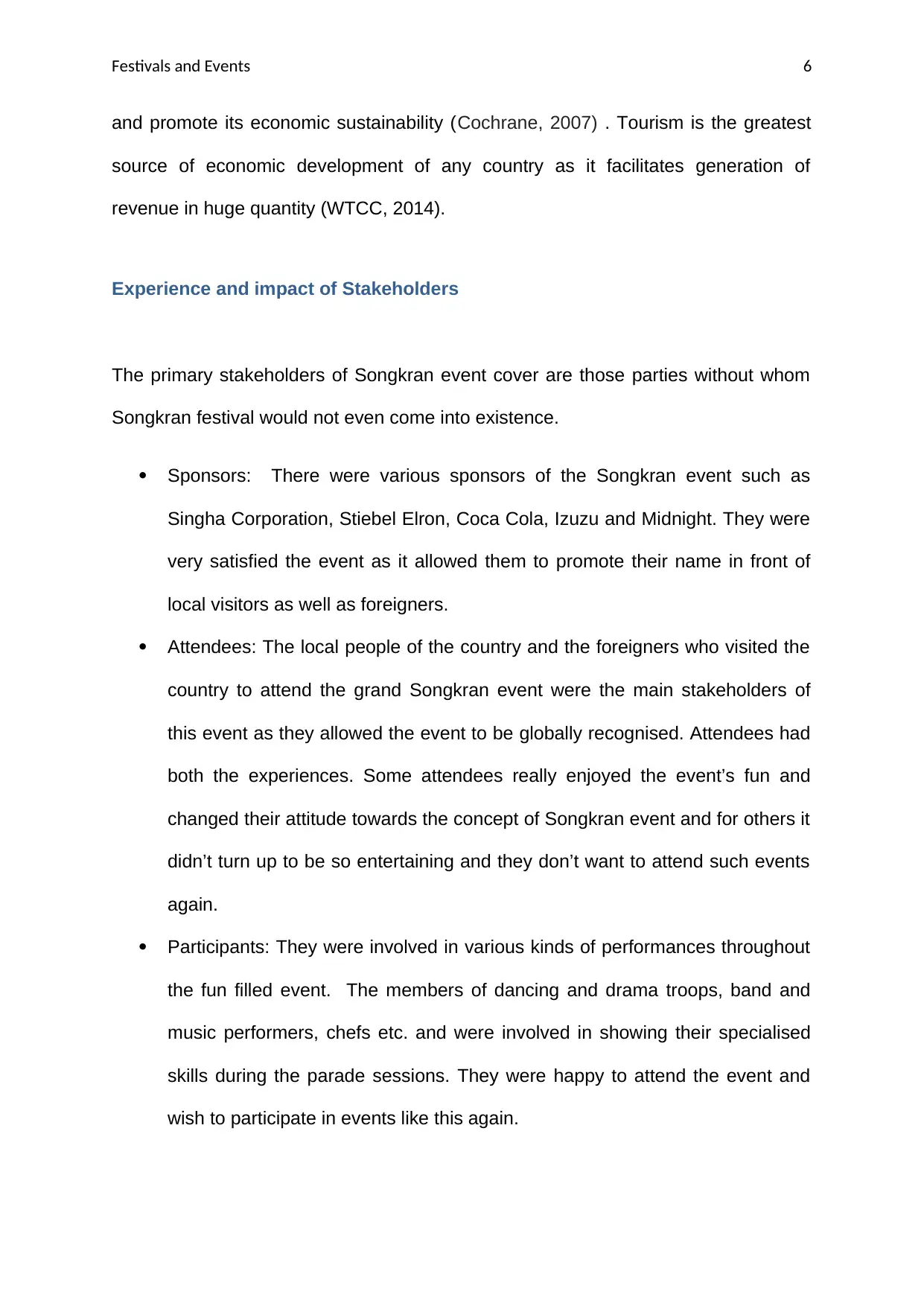
Festivals and Events 6
and promote its economic sustainability (Cochrane, 2007) . Tourism is the greatest
source of economic development of any country as it facilitates generation of
revenue in huge quantity (WTCC, 2014).
Experience and impact of Stakeholders
The primary stakeholders of Songkran event cover are those parties without whom
Songkran festival would not even come into existence.
Sponsors: There were various sponsors of the Songkran event such as
Singha Corporation, Stiebel Elron, Coca Cola, Izuzu and Midnight. They were
very satisfied the event as it allowed them to promote their name in front of
local visitors as well as foreigners.
Attendees: The local people of the country and the foreigners who visited the
country to attend the grand Songkran event were the main stakeholders of
this event as they allowed the event to be globally recognised. Attendees had
both the experiences. Some attendees really enjoyed the event’s fun and
changed their attitude towards the concept of Songkran event and for others it
didn’t turn up to be so entertaining and they don’t want to attend such events
again.
Participants: They were involved in various kinds of performances throughout
the fun filled event. The members of dancing and drama troops, band and
music performers, chefs etc. and were involved in showing their specialised
skills during the parade sessions. They were happy to attend the event and
wish to participate in events like this again.
and promote its economic sustainability (Cochrane, 2007) . Tourism is the greatest
source of economic development of any country as it facilitates generation of
revenue in huge quantity (WTCC, 2014).
Experience and impact of Stakeholders
The primary stakeholders of Songkran event cover are those parties without whom
Songkran festival would not even come into existence.
Sponsors: There were various sponsors of the Songkran event such as
Singha Corporation, Stiebel Elron, Coca Cola, Izuzu and Midnight. They were
very satisfied the event as it allowed them to promote their name in front of
local visitors as well as foreigners.
Attendees: The local people of the country and the foreigners who visited the
country to attend the grand Songkran event were the main stakeholders of
this event as they allowed the event to be globally recognised. Attendees had
both the experiences. Some attendees really enjoyed the event’s fun and
changed their attitude towards the concept of Songkran event and for others it
didn’t turn up to be so entertaining and they don’t want to attend such events
again.
Participants: They were involved in various kinds of performances throughout
the fun filled event. The members of dancing and drama troops, band and
music performers, chefs etc. and were involved in showing their specialised
skills during the parade sessions. They were happy to attend the event and
wish to participate in events like this again.
Paraphrase This Document
Need a fresh take? Get an instant paraphrase of this document with our AI Paraphraser
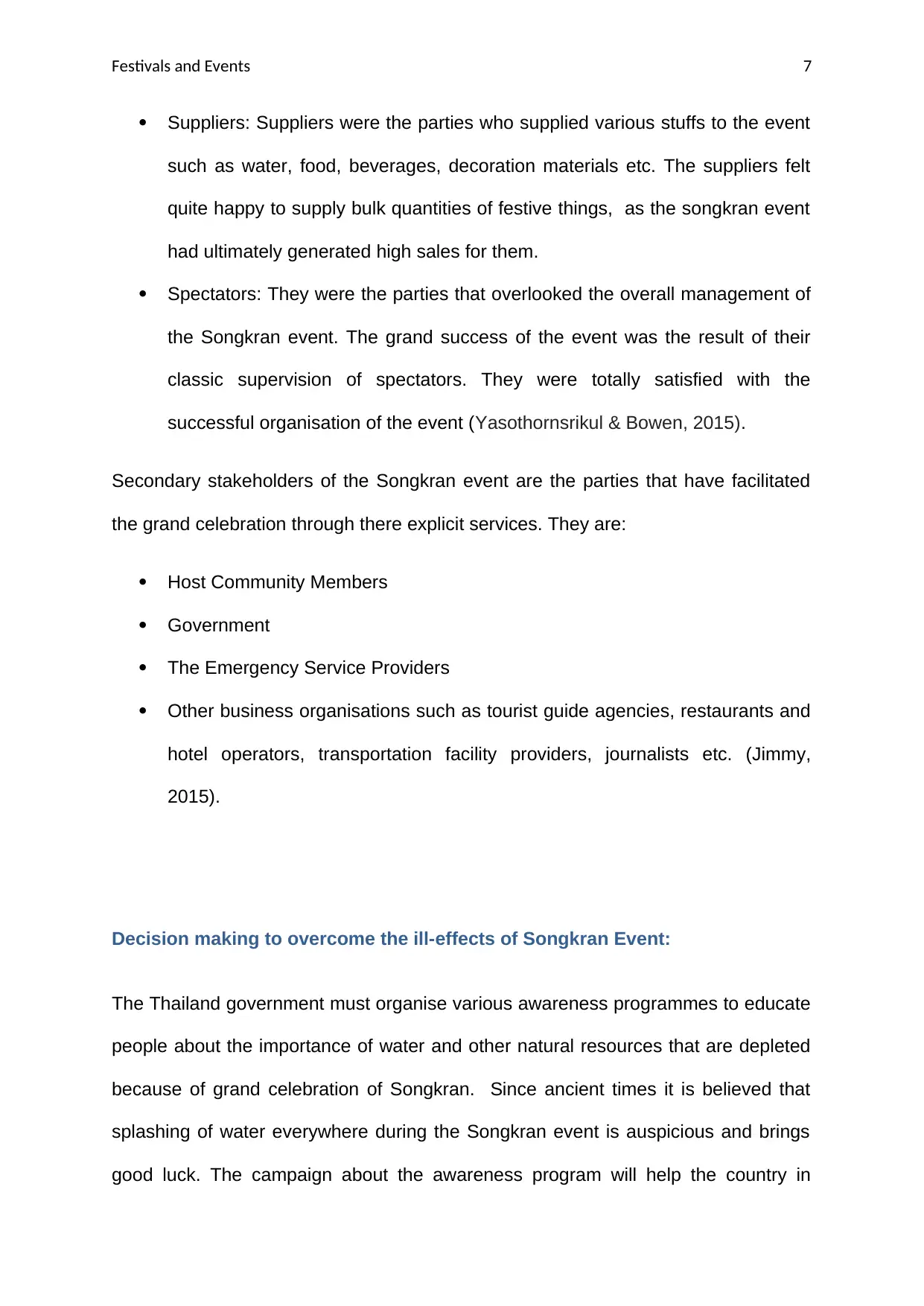
Festivals and Events 7
Suppliers: Suppliers were the parties who supplied various stuffs to the event
such as water, food, beverages, decoration materials etc. The suppliers felt
quite happy to supply bulk quantities of festive things, as the songkran event
had ultimately generated high sales for them.
Spectators: They were the parties that overlooked the overall management of
the Songkran event. The grand success of the event was the result of their
classic supervision of spectators. They were totally satisfied with the
successful organisation of the event (Yasothornsrikul & Bowen, 2015).
Secondary stakeholders of the Songkran event are the parties that have facilitated
the grand celebration through there explicit services. They are:
Host Community Members
Government
The Emergency Service Providers
Other business organisations such as tourist guide agencies, restaurants and
hotel operators, transportation facility providers, journalists etc. (Jimmy,
2015).
Decision making to overcome the ill-effects of Songkran Event:
The Thailand government must organise various awareness programmes to educate
people about the importance of water and other natural resources that are depleted
because of grand celebration of Songkran. Since ancient times it is believed that
splashing of water everywhere during the Songkran event is auspicious and brings
good luck. The campaign about the awareness program will help the country in
Suppliers: Suppliers were the parties who supplied various stuffs to the event
such as water, food, beverages, decoration materials etc. The suppliers felt
quite happy to supply bulk quantities of festive things, as the songkran event
had ultimately generated high sales for them.
Spectators: They were the parties that overlooked the overall management of
the Songkran event. The grand success of the event was the result of their
classic supervision of spectators. They were totally satisfied with the
successful organisation of the event (Yasothornsrikul & Bowen, 2015).
Secondary stakeholders of the Songkran event are the parties that have facilitated
the grand celebration through there explicit services. They are:
Host Community Members
Government
The Emergency Service Providers
Other business organisations such as tourist guide agencies, restaurants and
hotel operators, transportation facility providers, journalists etc. (Jimmy,
2015).
Decision making to overcome the ill-effects of Songkran Event:
The Thailand government must organise various awareness programmes to educate
people about the importance of water and other natural resources that are depleted
because of grand celebration of Songkran. Since ancient times it is believed that
splashing of water everywhere during the Songkran event is auspicious and brings
good luck. The campaign about the awareness program will help the country in
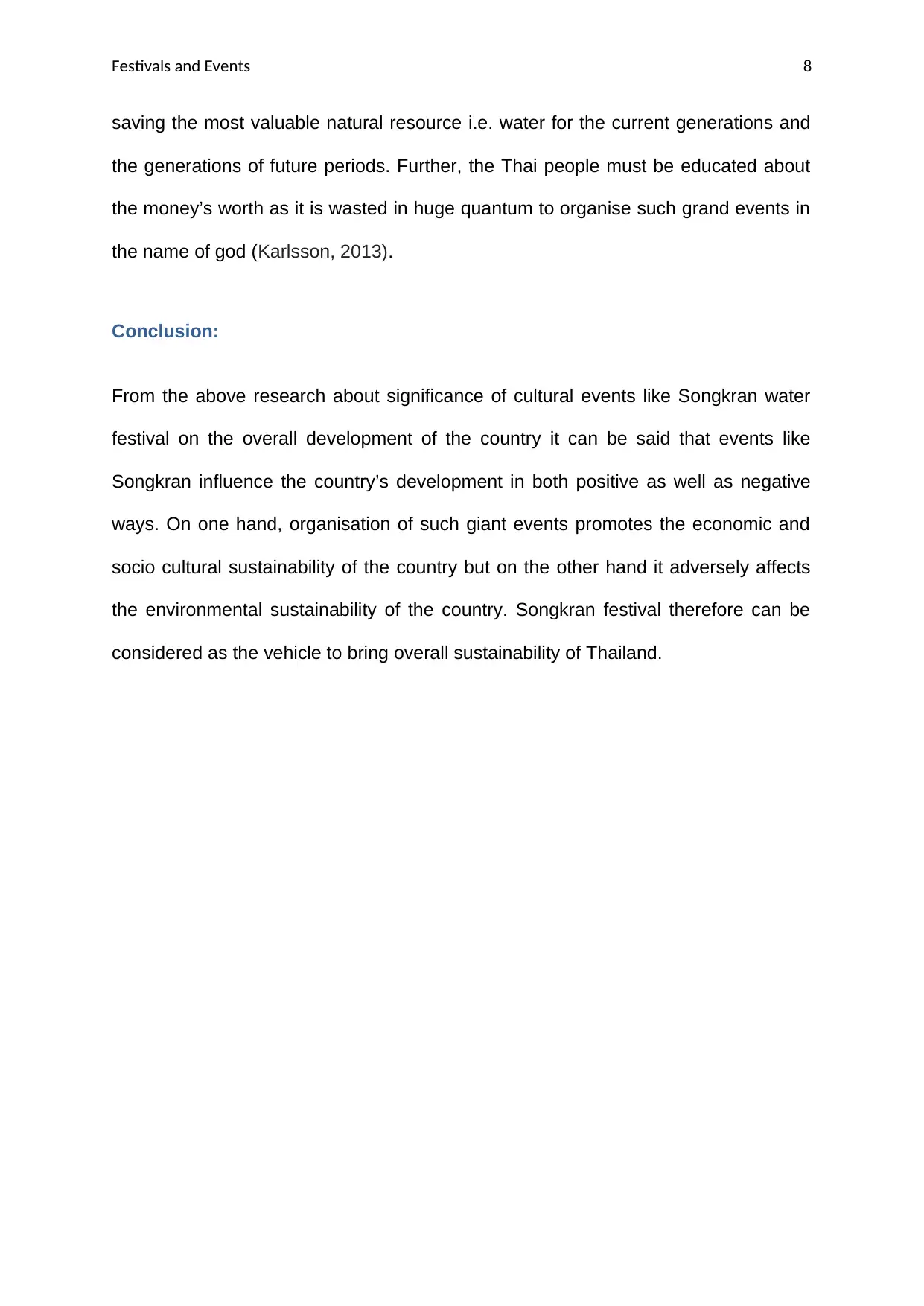
Festivals and Events 8
saving the most valuable natural resource i.e. water for the current generations and
the generations of future periods. Further, the Thai people must be educated about
the money’s worth as it is wasted in huge quantum to organise such grand events in
the name of god (Karlsson, 2013).
Conclusion:
From the above research about significance of cultural events like Songkran water
festival on the overall development of the country it can be said that events like
Songkran influence the country’s development in both positive as well as negative
ways. On one hand, organisation of such giant events promotes the economic and
socio cultural sustainability of the country but on the other hand it adversely affects
the environmental sustainability of the country. Songkran festival therefore can be
considered as the vehicle to bring overall sustainability of Thailand.
saving the most valuable natural resource i.e. water for the current generations and
the generations of future periods. Further, the Thai people must be educated about
the money’s worth as it is wasted in huge quantum to organise such grand events in
the name of god (Karlsson, 2013).
Conclusion:
From the above research about significance of cultural events like Songkran water
festival on the overall development of the country it can be said that events like
Songkran influence the country’s development in both positive as well as negative
ways. On one hand, organisation of such giant events promotes the economic and
socio cultural sustainability of the country but on the other hand it adversely affects
the environmental sustainability of the country. Songkran festival therefore can be
considered as the vehicle to bring overall sustainability of Thailand.
⊘ This is a preview!⊘
Do you want full access?
Subscribe today to unlock all pages.

Trusted by 1+ million students worldwide
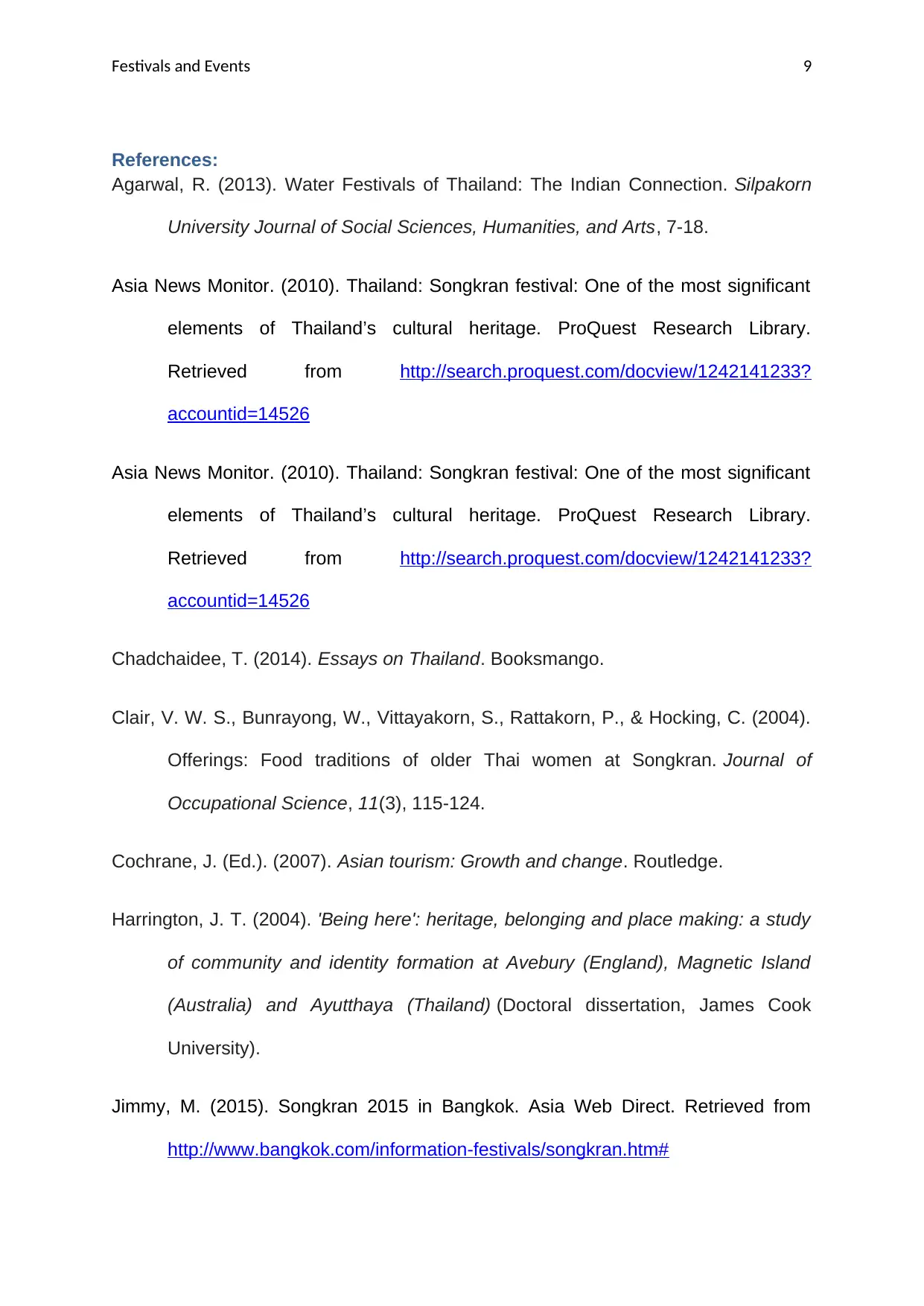
Festivals and Events 9
References:
Agarwal, R. (2013). Water Festivals of Thailand: The Indian Connection. Silpakorn
University Journal of Social Sciences, Humanities, and Arts, 7-18.
Asia News Monitor. (2010). Thailand: Songkran festival: One of the most significant
elements of Thailand’s cultural heritage. ProQuest Research Library.
Retrieved from http://search.proquest.com/docview/1242141233?
accountid=14526
Asia News Monitor. (2010). Thailand: Songkran festival: One of the most significant
elements of Thailand’s cultural heritage. ProQuest Research Library.
Retrieved from http://search.proquest.com/docview/1242141233?
accountid=14526
Chadchaidee, T. (2014). Essays on Thailand. Booksmango.
Clair, V. W. S., Bunrayong, W., Vittayakorn, S., Rattakorn, P., & Hocking, C. (2004).
Offerings: Food traditions of older Thai women at Songkran. Journal of
Occupational Science, 11(3), 115-124.
Cochrane, J. (Ed.). (2007). Asian tourism: Growth and change. Routledge.
Harrington, J. T. (2004). 'Being here': heritage, belonging and place making: a study
of community and identity formation at Avebury (England), Magnetic Island
(Australia) and Ayutthaya (Thailand) (Doctoral dissertation, James Cook
University).
Jimmy, M. (2015). Songkran 2015 in Bangkok. Asia Web Direct. Retrieved from
http://www.bangkok.com/information-festivals/songkran.htm#
References:
Agarwal, R. (2013). Water Festivals of Thailand: The Indian Connection. Silpakorn
University Journal of Social Sciences, Humanities, and Arts, 7-18.
Asia News Monitor. (2010). Thailand: Songkran festival: One of the most significant
elements of Thailand’s cultural heritage. ProQuest Research Library.
Retrieved from http://search.proquest.com/docview/1242141233?
accountid=14526
Asia News Monitor. (2010). Thailand: Songkran festival: One of the most significant
elements of Thailand’s cultural heritage. ProQuest Research Library.
Retrieved from http://search.proquest.com/docview/1242141233?
accountid=14526
Chadchaidee, T. (2014). Essays on Thailand. Booksmango.
Clair, V. W. S., Bunrayong, W., Vittayakorn, S., Rattakorn, P., & Hocking, C. (2004).
Offerings: Food traditions of older Thai women at Songkran. Journal of
Occupational Science, 11(3), 115-124.
Cochrane, J. (Ed.). (2007). Asian tourism: Growth and change. Routledge.
Harrington, J. T. (2004). 'Being here': heritage, belonging and place making: a study
of community and identity formation at Avebury (England), Magnetic Island
(Australia) and Ayutthaya (Thailand) (Doctoral dissertation, James Cook
University).
Jimmy, M. (2015). Songkran 2015 in Bangkok. Asia Web Direct. Retrieved from
http://www.bangkok.com/information-festivals/songkran.htm#
Paraphrase This Document
Need a fresh take? Get an instant paraphrase of this document with our AI Paraphraser
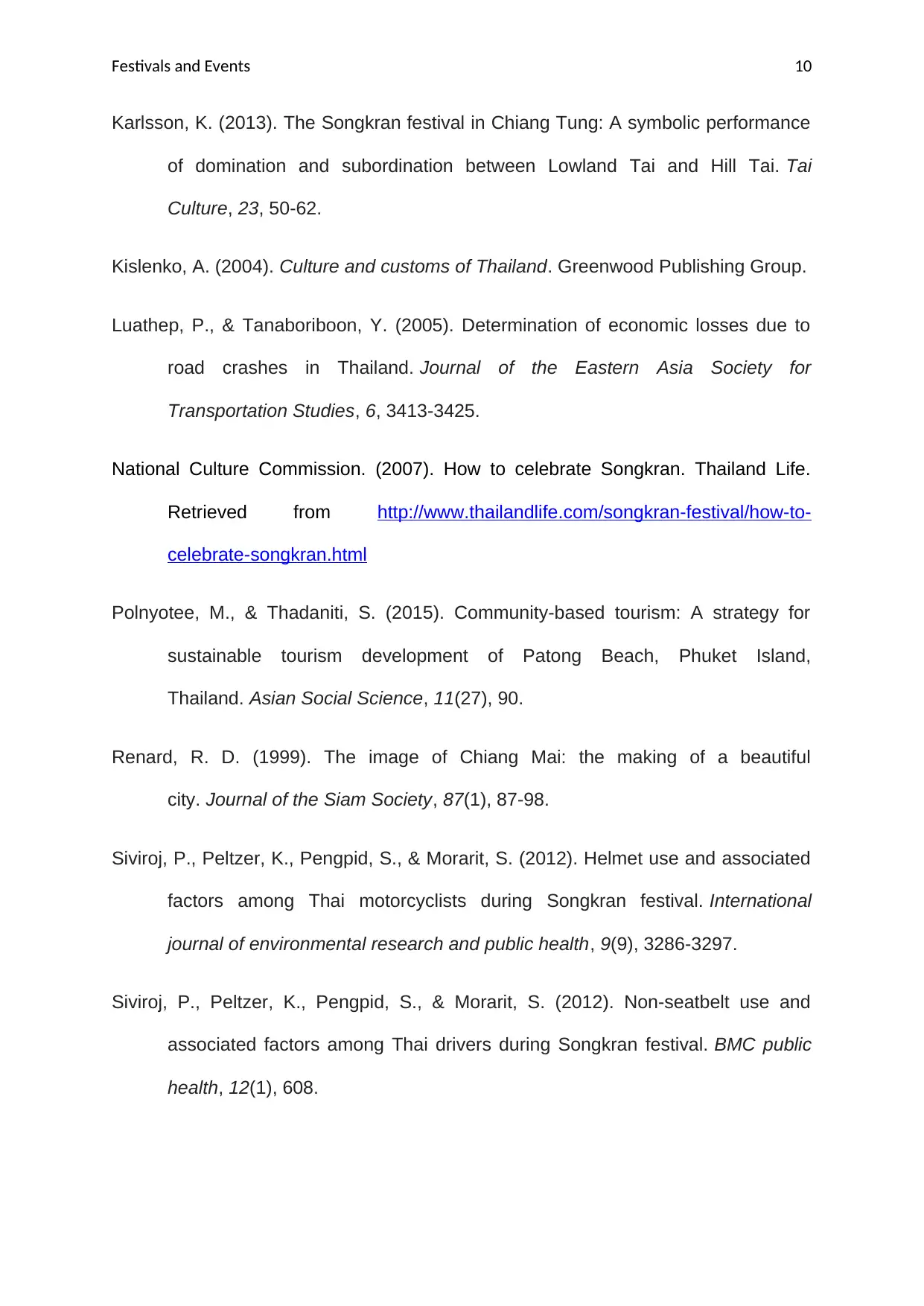
Festivals and Events 10
Karlsson, K. (2013). The Songkran festival in Chiang Tung: A symbolic performance
of domination and subordination between Lowland Tai and Hill Tai. Tai
Culture, 23, 50-62.
Kislenko, A. (2004). Culture and customs of Thailand. Greenwood Publishing Group.
Luathep, P., & Tanaboriboon, Y. (2005). Determination of economic losses due to
road crashes in Thailand. Journal of the Eastern Asia Society for
Transportation Studies, 6, 3413-3425.
National Culture Commission. (2007). How to celebrate Songkran. Thailand Life.
Retrieved from http://www.thailandlife.com/songkran-festival/how-to-
celebrate-songkran.html
Polnyotee, M., & Thadaniti, S. (2015). Community-based tourism: A strategy for
sustainable tourism development of Patong Beach, Phuket Island,
Thailand. Asian Social Science, 11(27), 90.
Renard, R. D. (1999). The image of Chiang Mai: the making of a beautiful
city. Journal of the Siam Society, 87(1), 87-98.
Siviroj, P., Peltzer, K., Pengpid, S., & Morarit, S. (2012). Helmet use and associated
factors among Thai motorcyclists during Songkran festival. International
journal of environmental research and public health, 9(9), 3286-3297.
Siviroj, P., Peltzer, K., Pengpid, S., & Morarit, S. (2012). Non-seatbelt use and
associated factors among Thai drivers during Songkran festival. BMC public
health, 12(1), 608.
Karlsson, K. (2013). The Songkran festival in Chiang Tung: A symbolic performance
of domination and subordination between Lowland Tai and Hill Tai. Tai
Culture, 23, 50-62.
Kislenko, A. (2004). Culture and customs of Thailand. Greenwood Publishing Group.
Luathep, P., & Tanaboriboon, Y. (2005). Determination of economic losses due to
road crashes in Thailand. Journal of the Eastern Asia Society for
Transportation Studies, 6, 3413-3425.
National Culture Commission. (2007). How to celebrate Songkran. Thailand Life.
Retrieved from http://www.thailandlife.com/songkran-festival/how-to-
celebrate-songkran.html
Polnyotee, M., & Thadaniti, S. (2015). Community-based tourism: A strategy for
sustainable tourism development of Patong Beach, Phuket Island,
Thailand. Asian Social Science, 11(27), 90.
Renard, R. D. (1999). The image of Chiang Mai: the making of a beautiful
city. Journal of the Siam Society, 87(1), 87-98.
Siviroj, P., Peltzer, K., Pengpid, S., & Morarit, S. (2012). Helmet use and associated
factors among Thai motorcyclists during Songkran festival. International
journal of environmental research and public health, 9(9), 3286-3297.
Siviroj, P., Peltzer, K., Pengpid, S., & Morarit, S. (2012). Non-seatbelt use and
associated factors among Thai drivers during Songkran festival. BMC public
health, 12(1), 608.
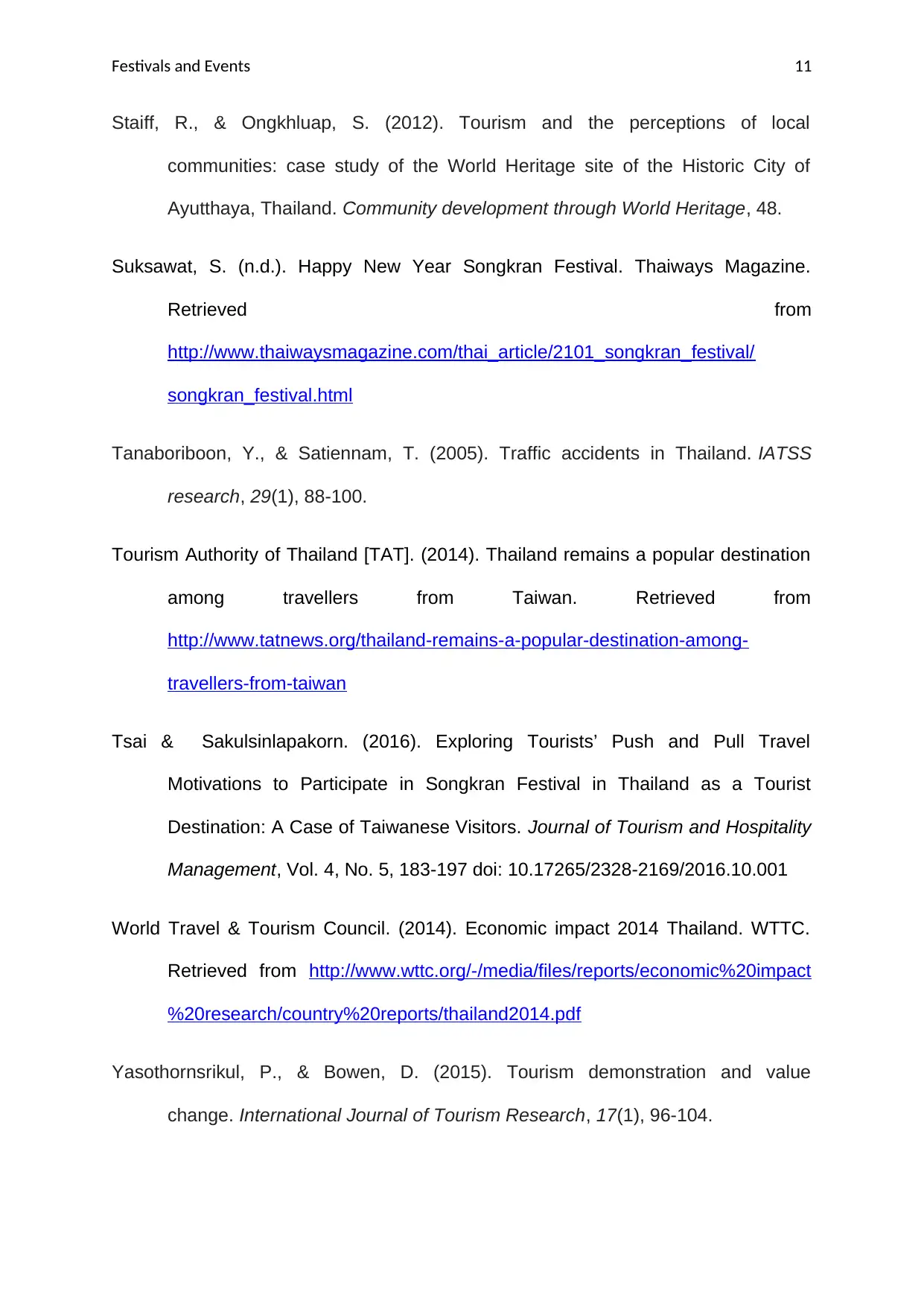
Festivals and Events 11
Staiff, R., & Ongkhluap, S. (2012). Tourism and the perceptions of local
communities: case study of the World Heritage site of the Historic City of
Ayutthaya, Thailand. Community development through World Heritage, 48.
Suksawat, S. (n.d.). Happy New Year Songkran Festival. Thaiways Magazine.
Retrieved from
http://www.thaiwaysmagazine.com/thai_article/2101_songkran_festival/
songkran_festival.html
Tanaboriboon, Y., & Satiennam, T. (2005). Traffic accidents in Thailand. IATSS
research, 29(1), 88-100.
Tourism Authority of Thailand [TAT]. (2014). Thailand remains a popular destination
among travellers from Taiwan. Retrieved from
http://www.tatnews.org/thailand-remains-a-popular-destination-among-
travellers-from-taiwan
Tsai & Sakulsinlapakorn. (2016). Exploring Tourists’ Push and Pull Travel
Motivations to Participate in Songkran Festival in Thailand as a Tourist
Destination: A Case of Taiwanese Visitors. Journal of Tourism and Hospitality
Management, Vol. 4, No. 5, 183-197 doi: 10.17265/2328-2169/2016.10.001
World Travel & Tourism Council. (2014). Economic impact 2014 Thailand. WTTC.
Retrieved from http://www.wttc.org/-/media/files/reports/economic%20impact
%20research/country%20reports/thailand2014.pdf
Yasothornsrikul, P., & Bowen, D. (2015). Tourism demonstration and value
change. International Journal of Tourism Research, 17(1), 96-104.
Staiff, R., & Ongkhluap, S. (2012). Tourism and the perceptions of local
communities: case study of the World Heritage site of the Historic City of
Ayutthaya, Thailand. Community development through World Heritage, 48.
Suksawat, S. (n.d.). Happy New Year Songkran Festival. Thaiways Magazine.
Retrieved from
http://www.thaiwaysmagazine.com/thai_article/2101_songkran_festival/
songkran_festival.html
Tanaboriboon, Y., & Satiennam, T. (2005). Traffic accidents in Thailand. IATSS
research, 29(1), 88-100.
Tourism Authority of Thailand [TAT]. (2014). Thailand remains a popular destination
among travellers from Taiwan. Retrieved from
http://www.tatnews.org/thailand-remains-a-popular-destination-among-
travellers-from-taiwan
Tsai & Sakulsinlapakorn. (2016). Exploring Tourists’ Push and Pull Travel
Motivations to Participate in Songkran Festival in Thailand as a Tourist
Destination: A Case of Taiwanese Visitors. Journal of Tourism and Hospitality
Management, Vol. 4, No. 5, 183-197 doi: 10.17265/2328-2169/2016.10.001
World Travel & Tourism Council. (2014). Economic impact 2014 Thailand. WTTC.
Retrieved from http://www.wttc.org/-/media/files/reports/economic%20impact
%20research/country%20reports/thailand2014.pdf
Yasothornsrikul, P., & Bowen, D. (2015). Tourism demonstration and value
change. International Journal of Tourism Research, 17(1), 96-104.
⊘ This is a preview!⊘
Do you want full access?
Subscribe today to unlock all pages.

Trusted by 1+ million students worldwide
1 out of 12
Your All-in-One AI-Powered Toolkit for Academic Success.
+13062052269
info@desklib.com
Available 24*7 on WhatsApp / Email
![[object Object]](/_next/static/media/star-bottom.7253800d.svg)
Unlock your academic potential
Copyright © 2020–2026 A2Z Services. All Rights Reserved. Developed and managed by ZUCOL.

